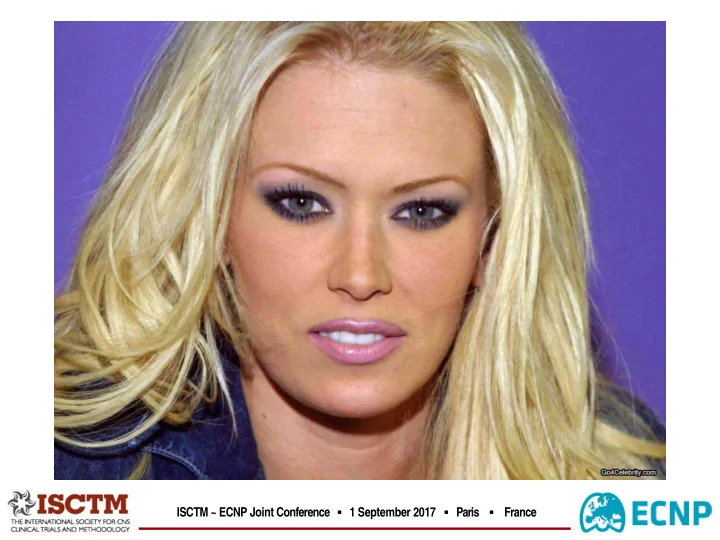

ISCTM ~ ECNP Joint Conference ▪ 1 September 2017 ▪ Paris ▪ France
Supreme Court Justice Potter Stewart’s Comment on Pornography ”I can’t tell you what it is, but I know it when I see it.” ISCTM ~ ECNP Joint Conference ▪ 1 September 2017 ▪ Paris ▪ France
Negative Symptoms as Pathological Features of SCZ • Kraepelin: “we observe a weakening of those emotional activities which permanently form the mainsprings of volition… The result is emotional dullness, .. Loss of mastery over volition, of endeavor, and ability for independent action. The essence of the personality is thereby destroyed” • Bleuler “patients appear lazy and negligent because they no longer have the urge to do anything either of their own initiative or at the bidding of another…. In mild cases, where wishes and desires still exist, they will nevertheless do nothing toward the realization of these wishes”
Primary and Secondary Negative Symptoms Fervaha et al, European Psychiatry 2014
Where in the brain are negative symptoms based? Parietal cortex ACC Basal Ganglia DLPFC Pallidum CP Caudate Putamen Ventral VP Pallidum VTA (DA) Thalamus (Glu) OFC* PFCX SNrc VTA Amygdala** Nucleus Accumbens DA perikarya: Reward Motivation ISCTM ~ ECNP Joint Conference ▪ 1 September 2017 ▪ Paris ▪ France 5
Methods of Assessment of Negative Symptoms • Clinical Assessment Instruments • Behavioral Biomarkers • Neuroimaging
Pathways to Progress in Understanding and Treating Negative Sxs • Core Readout or Biomarker • Genetic Association • Gene Product as Biomarker or Therapeutic Target • Animal Models to Deconstruct Cognitive Components or Neural Basis
Schizophrenia: target “circuitry” and core readout?
Targets of Interest for Cognitive Enhancement MATRICS Neuropsychopharmacology Committee n Alpha-7 nicotinic receptor agonists 31 n DA-D1 receptor agonists 30 n AMPA glutamatergic receptor agonists 14 n NMDA glutamatergic receptor agonists 12 n Metabotropic glutamate receptor agonists 12 n Glycine reuptake inhibitors 8 n M1 muscarinic receptor agonists 7 n GABA A R subtype selective agonists 5 Tamminga, Geyer et al 2002
DA receptors in nucleus accumbens regulate motivated behavior. Selective stimulation of D1Rs in direct pathway or increased D2Rs in indirect pathway of adult NAc enhances motivation and reward seeking behavior. • Different functions: Direct Indirect No GO! GO! Receptors differ in their signalin g: • Kreitzer and Malenka, Neuron 2008 . D1 D2 Different gene expression patterns: • Direct Indirect D1R , M4, dynorphin, D2R , A2AR, substance P enkephalin Lobo and Nestler, Front Neuroanat , 2008.
Developing D1R agonists possibly through allosteric modulation Targeting D2R in Medium Spiny Neurons function: a cell-selective approach D2Rs Signal Via G-protein Dependent and Independent (Arrestin) Pathways GIRK D2R Synaptic Transmission: (Kv1.2, volt. gat. Ca 2+ Ch.) Gi/oGbg Arrestin ? The promise of Adenylate functional selectivity Cyclase Akt/GSK3b ? Excitability, Glutamatergic Input
Factors Affecting Negative Sxs Response in Clinical Trials • Inclusion Criteria • Sx Severity • Illness Duration • Number of Study Arms and Sites • Centralized Ratings • Adjunctive vs Monotherapy • Industry Sponsorship • Commercial vs Academic Sites • Better Models of Pathophysiology, Targets, Therapeutics
Discussion First let’s hear from the FDA
Recommend
More recommend